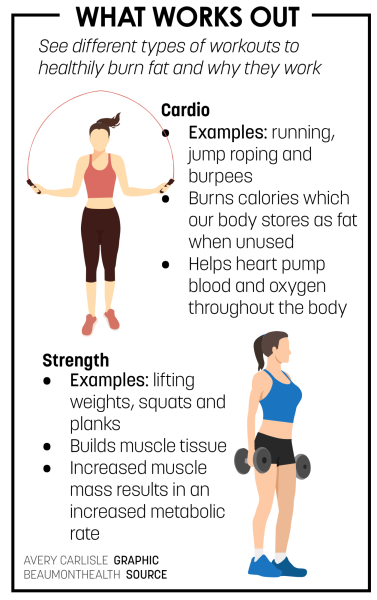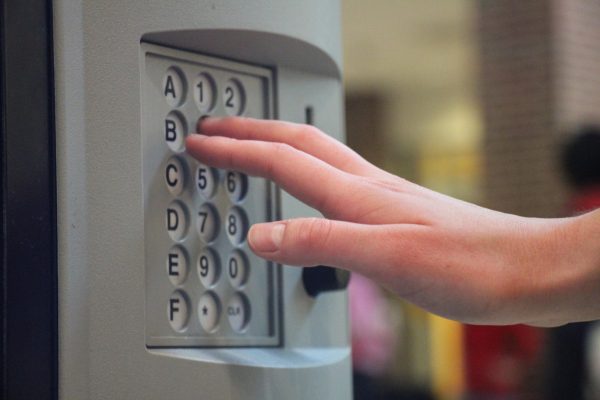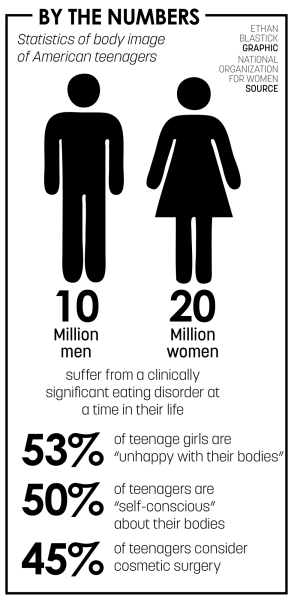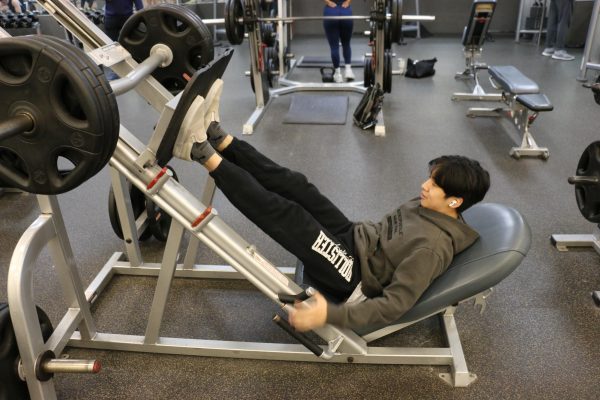Senior John Sormillon wakes up in the morning and heads straight to the mirror. He gazes at the mirror for a minute, looking at his body from all angles. As he shakes his head, he gets dressed for school, knowing that he has not yet achieved his ideal body. For Sormillon, his reflection in the mirror has always told him he was underweight. With people around him taller and bigger than he was, he said he wanted to change the way his body looked.
“It was my junior year and then all my peers were a lot bigger and taller than me,” he said. “And then looking at the mirror shirtless, I could see all of my ribs showing. And if I put my hand around my wrist, the thumb and pointer finger would overlap. I was super thin and skinny, so it really weighed down on my self-confidence and self-esteem.”
To combat these perceptions, Sormillon said he has been employing a “bulking” dieting technique for the past

year, which mainly involves increasing the daily intake of calories.
“Bulking for me is just eating a lot of food, particularly prioritizing high protein and to create a caloric surplus,” he said. “This means eating above my maintained amount of calories so that I can gain weight and muscle, but not too much to where it becomes fat.”
Sormillon is one of the many teenagers who struggle with their body image. A study published in the Journal of Paediatrics and Child Health found that about one in every two teenage girls and one in every four teenage boys have tried dieting to change the shape of their bodies, globally. With February being National Eating Disorders Awareness Month, students and eating disorder experts analyze the effects of the environment and dieting on body image.
mirror image
Jen Elliott, an eating disorder therapist and certified intuitive eating counselor, said teens are especially vulnerable to eating disorders because they are still trying to find their identity.
“I feel like as a teenager, you’re trying to figure out who you are,” she said. “Who am I in this world? What do I like to do? All of those things. And so one way you might try to do that is by going to the gym and changing your body. We live in a culture where ‘fit’ bodies and dieting is the norm or it’s what we’re told makes us worthy and acceptable. And so if someone is trying to find out how they can be worthy or acceptable, then we’ve got a really easy way in our culture: losing weight, dieting and changing your body.”
Chris Yu, a senior who is engaging in the “cutting” method to lose weight, said although he has gotten compliments about his weight loss from other people, he still said he sees little to no change in his physical appearance when looking at the mirror.
“I’d say there’s definitely more confidence with people telling you that you look good. It just makes you feel a lot better about yourself,” he said. “Me personally, I don’t see much difference when I look at myself. My friends say I’ve lost a lot of face fat. It’s probably similar to body dysmorphia. I wouldn’t say I see no difference. I definitely see a little bit, but when I look at myself, I am too used to seeing myself how I was before so I don’t notice too much.”
Naomi Fields, former AP Psychology student who researched eating disorders and senior, said people often see themselves differently than how others see them.
“It’s called body dysmorphia,” Fields said. “The way you see yourself is different from the way everyone else sees you. Everyone else might think you’re really smart, while you might be thinking you’re average or you just do well on tests. Well, you can take that same lens of how you view your own intellect and apply it to how you view your body. Everyone else will realize you’re in good shape or you look good, whatever it is. And you just might be completely unable to see that because it’s your own head and you’re always going to be your own worst critic.”
rooted in the environment

(Nora Mariano)
Fields also said environmental factors often encourage dieting. She said the current trends in social media idolize specific body types.
“I think if you have social media, pretty frequently you’re seeing bodies and body types that have been idolized by the population as a whole,” she said, “and I think that it’s really normal to want to look like that because you want to look good. You want people to like how you look. But so frequently, those images are photoshopped or you don’t know what the person in that image is really doing to maintain that body type. I think the other thing about it is that you don’t realize that they’re just another person too. You idolize them in your head and then you just become obsessed with it.”
A report from Grand View Research showed that the global weight management market size was valued at $142.58 billion. Fields said these industries sponsor influencers on social media, which often allows direct marketing toward teenagers, spreading dieting trends on social media even further.
Dr. Carrie Carter, owner of Carter Psychology and president of the Eating Disorder Task Force of Indiana, said the increased accessibility of food has also encouraged dieting along with social media.
“To some extent, we’re surrounded by food all the time,” she said. “We no longer have to go out, hunt, kill, garden and do all of that. So, how do we feel our best and maintain the weight that our bodies need to be maintaining in the midst of all this food? There are also mixed messages everywhere. We’re constantly surrounded by fast food, yet told we need to be skinny and we need to be fit. So it leaves us with the feeling like, ‘What the heck are we supposed to do?’”
For Yu, he said the opinions of other people were a major factor in starting his diet. He said he mostly received comments about him being overweight.
“Some of my friends definitely made jokes about me for being a little bit overweight, but it is definitely something that helped motivate me,” he said. “I know my friends aren’t that serious about it and they wouldn’t care if I was fat or not. However, it makes me feel a lot better that I’m not getting as many jokes pointed at me now.”

Although Yu said those comments served as a motivator, Lizzie Woerner, a registered dietitian specializing in eating disorders, said the comments of other people could have lasting effects, possibly triggering an eating disorder for some people.
“Sadly, I see a lot of people suffering from eating disorders where one comment from a teacher, from someone on a sports team or from a coach can send them into a whole spiral,” she said. “And the sadder part is that those people don’t realize how much those comments are affecting the mental health of the people who are struggling. It’s not just affecting what they’re eating, but it’s affecting how they think about themselves, how they’re sleeping or what they’re thinking about during the day.”
Comments from others are not only restricted to outside of the home, according to Elliott. She said a common trigger for teenagers who develop eating disorders comes from within the home, primarily from parents.
“Something I often see is parents suggesting a diet for their teen that might be perceived as struggling with their weight or having a larger body than what they think their kids should have as a teenager,” she said. “I see doctors recommending the same to teenagers, which can be really damaging at an age when your body is supposed to grow and change. Teens can also see their parents struggling with their weight and body image so they might decide that they need to do the same. And so in order to fit in with their family, they may feel like changing their own body.”
all in the head
Sormillon said he still struggles to eat the amount necessary to continue his bulking diet.
“I have to force myself to eat more even when I feel full,” he said. “I also tell myself to get more food to eat during my meals, so my portion sizes are increased. And even after a year it’s still a challenge to get more food.”

(Saahas Kandru)
For his part, however, he said bulking has improved his self-esteem and confidence.
“I’ve gotten 30 or 40 pounds heavier and it’s definitely covered a lot of my insecurities,” he said. “I’ve gotten a
lot stronger and my frame has been filled out so you can see less bones and more muscle. And then it also helped me with my self-confidence, as I started wearing short-sleeved shirts and shorts more often because I wasn’t afraid to hide myself anymore. If the John a year ago saw the John now, I think I’d be really proud of how much progress I’ve made.”
As Sormillon continues his eating habits, Elliott said people should ultimately do what they think would make them most comfortable in their own bodies.
“I truly believe for some people, changing their body is a way of them feeling okay in it. And I think it’s so important to ask yourself why you’re dieting or why it’s important,” she said. “It’s okay to question things. It’s okay to want to lose weight. It’s okay and it makes sense. And it’s also okay to struggle and to not know what to do. I just want to encourage teens who don’t know what to do to not be afraid to seek help, whether it be from a therapist or another trusted adult. The bottom line is, your worth doesn’t come from the size of your body or your physical appearance. That’s not where your identity should come from or needs to come from. You are perfect just the way you are.”

